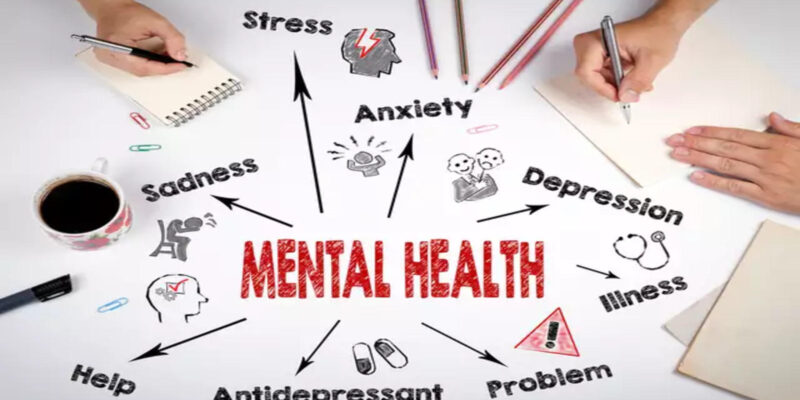
Introduction
Navigating mental health challenges is an essential journey for anyone seeking to improve their overall well-being. Mental health encompasses emotional, psychological, and social aspects of our lives, influencing how we think, feel, and behave. It is crucial to understand the various mental health challenges people face, recognize the signs and symptoms, and explore effective strategies for managing and overcoming these issues. This comprehensive guide delves into the common mental health challenges, their impact, and practical approaches to navigate them successfully.
Understanding Mental Health Challenges
Common Mental Health Issues
Mental health challenges vary widely, but some of the most common include:
- Anxiety Disorders: Characterized by excessive fear and worry, including generalized anxiety disorder (GAD), panic disorder, and social anxiety disorder.
- Depression: Persistent feelings of sadness, hopelessness, and a lack of interest in activities.
- Bipolar Disorder: Extreme mood swings, including episodes of mania and depression.
- Post-Traumatic Stress Disorder (PTSD): Anxiety and flashbacks triggered by a traumatic event.
- Obsessive-Compulsive Disorder (OCD): Recurrent, unwanted thoughts (obsessions) and repetitive behaviors (compulsions).
- Eating Disorders: Unhealthy eating behaviors, such as anorexia nervosa, bulimia nervosa, and binge-eating disorder.
- Personality Disorders: Enduring patterns of behavior and inner experiences, such as borderline personality disorder (BPD) and antisocial personality disorder.
Signs and Symptoms
Recognizing the signs and symptoms of mental health challenges is the first step toward seeking help. Common indicators include:
- Emotional Changes: Persistent sadness, irritability, or mood swings.
- Behavioral Changes: Withdrawal from social activities, changes in eating or sleeping patterns, and increased use of substances.
- Cognitive Changes: Difficulty concentrating, indecisiveness, and negative thinking patterns.
- Physical Symptoms: Unexplained aches and pains, fatigue, and changes in weight or appetite.
The Impact of Mental Health Challenges
On Individuals
Mental health challenges can profoundly impact individuals, affecting their daily lives and overall well-being. Some consequences include:
- Reduced Quality of Life: Decreased enjoyment of activities and relationships.
- Impaired Functioning: Difficulty performing daily tasks and maintaining responsibilities.
- Physical Health Issues: Increased risk of chronic conditions like heart disease and diabetes.
On Relationships
Mental health challenges also affect relationships with family, friends, and colleagues. Impacts include:
- Strained Relationships: Increased conflict and misunderstandings.
- Social Isolation: Withdrawal from social interactions and activities.
- Caregiver Stress: Increased burden on those providing support and care.
On Society
At a broader level, mental health challenges affect society through:
- Economic Costs: Increased healthcare expenses and lost productivity.
- Public Health Concerns: Higher prevalence of substance abuse and related health issues.
- Stigmatization: Persistent stigma and discrimination against individuals with mental health conditions.
Strategies for Navigating Mental Health Challenges
Seeking Professional Help
Professional help is crucial for managing mental health challenges effectively. Options include:
- Therapy: Various forms of psychotherapy, such as cognitive-behavioral therapy (CBT), dialectical behavior therapy (DBT), and interpersonal therapy (IPT).
- Medication: Prescribed medications, including antidepressants, anti-anxiety drugs, and mood stabilizers, can be effective.
- Counseling: Professional counselors provide support and coping strategies for managing mental health issues.
Developing Coping Mechanisms
Effective coping mechanisms are essential for managing mental health challenges. Strategies include:
- Mindfulness and Meditation: Techniques such as mindfulness meditation, deep breathing exercises, and progressive muscle relaxation.
- Regular Exercise: Physical activity releases endorphins and reduces stress and anxiety.
- Healthy Lifestyle Choices: Maintaining a balanced diet, getting adequate sleep, and avoiding substance abuse.
Building a Support Network
A strong support network can provide emotional and practical assistance. Consider:
- Family and Friends: Sharing feelings and experiences with trusted individuals.
- Support Groups: Joining groups for people facing similar challenges.
- Community Resources: Utilizing local mental health services and organizations.
Stress Management Techniques
Implementing stress management techniques can help alleviate mental health challenges. These include:
- Time Management: Prioritizing tasks and setting realistic goals to reduce overwhelm.
- Relaxation Techniques: Practices such as yoga, tai chi, and guided imagery to promote relaxation.
- Hobbies and Interests: Engaging in activities that bring joy and relaxation.
Positive Thinking and Resilience Building
Cultivating a positive mindset and building resilience can enhance mental well-being. Strategies include:
- Gratitude Practice: Regularly reflecting on and appreciating positive aspects of life.
- Affirmations: Using positive statements to challenge negative thoughts and build self-esteem.
- Resilience Training: Developing the ability to bounce back from setbacks and view challenges as opportunities for growth.
Addressing Stigma and Promoting Awareness
Understanding Stigma
Stigma surrounding mental health often leads to discrimination and reluctance to seek help. It includes:
- Social Stigma: Negative attitudes and beliefs about people with mental health conditions.
- Self-Stigma: Internalizing these negative attitudes, leading to shame and low self-esteem.
Promoting Mental Health Awareness
Raising awareness about mental health can reduce stigma and encourage people to seek help. Strategies include:
- Education: Providing accurate information about mental health conditions and treatments.
- Advocacy: Supporting policies and initiatives that promote mental health and well-being.
- Open Conversations: Encouraging dialogue about mental health to normalize the discussion and reduce shame.
The Role of Communities and Organizations
Supportive Communities
Communities play a crucial role in promoting mental health. Supportive communities:
- Provide Resources: Offer access to mental health services and support groups.
- Foster Inclusion: Create environments where everyone feels accepted and valued.
- Encourage Engagement: Promote activities that build connections and support well-being.
Workplace Mental Health
Organizations can support mental health by:
- Creating Supportive Work Environments: Promoting work-life balance and reducing workplace stress.
- Providing Mental Health Resources: Offering employee assistance programs (EAPs) and mental health days.
- Training and Awareness: Educating employees about mental health and how to seek help.
Practical Tips for Everyday Mental Health Care
Daily Self-Care
Incorporating self-care practices into daily routines can significantly improve mental health. Tips include:
- Morning Routine: Start the day with activities that promote calmness and focus, such as stretching or a brief meditation session.
- Healthy Eating: Plan balanced meals and snacks to maintain energy and mood stability throughout the day.
- Sleep Hygiene: Establish a regular sleep schedule and create a relaxing bedtime routine.
Balancing Technology Use
Mindful technology use can prevent mental health deterioration. Strategies include:
- Screen Time Limits: Set boundaries for daily screen time to avoid digital overload.
- Social Media Detox: Take regular breaks from social media to reduce anxiety and comparison.
- Tech-Free Zones: Designate areas in your home where technology use is limited, promoting face-to-face interactions and relaxation.
Pursuing Hobbies and Interests
Engaging in activities you enjoy can enhance mental well-being. Consider:
- Creative Outlets: Activities like painting, writing, or playing an instrument can provide an emotional release and a sense of accomplishment.
- Physical Activities: Sports, dance, or outdoor adventures can boost mood and physical health.
- Learning Opportunities: Pursuing new skills or hobbies keeps the mind engaged and can foster a sense of purpose.
Conclusion
Navigating mental health challenges requires a multifaceted approach involving professional help, effective coping mechanisms, strong support networks, and proactive self-care. By understanding the common mental health issues, recognizing the signs and symptoms, and implementing practical strategies, individuals can manage and overcome their mental health challenges successfully. Addressing stigma, promoting awareness, and fostering supportive communities are also crucial steps toward creating a world where mental health is prioritized, and everyone has the opportunity to thrive.









